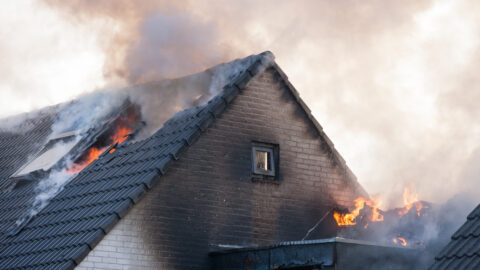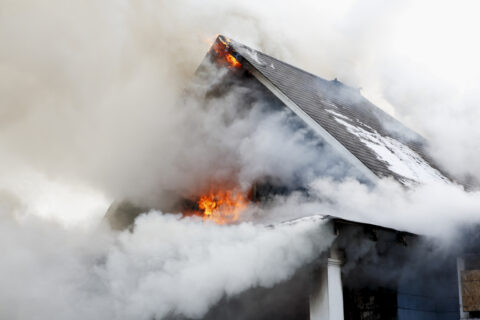
Even though a fire might be out, the effects of smoke and fire damage can linger for a long time, unless you take appropriate steps to counter them.
Smoke Odors
Smoke odors are common after a fire. These can linger for a long time. Not only does smoke permeate the air, but it can penetrate all the contents of a space, and even make its way into the walls. Over months or even years, the smoke odor can then slowly seep out.
For some types of surfaces, you can remove smoke odors yourself. However, once smoke odors have penetrated materials, there is often very little that you can do to remove them. Professional treatment can sometimes eliminate the odors in the wall, but other times the only way to eliminate them is to remove contaminated materials like insulation. The contents of your home are a similar situation. Some items you can clean yourself, and others might respond to professional restoration, but in some cases, it’s best to replace the smoke-damaged contents.
Toxic Residue
The odor of smoke and soot is composed of many chemicals. Some of these might smell bad, but don’t have any negative health effects. Others can be dangerous. Burning materials in your house can release numerous toxic chemicals. Some of these toxic chemicals, like carbon monoxide, are released immediately and can kill immediately. They also dissipate shortly after the fire is out with proper ventilation.
Sometimes, though, the residue of smoke and ash can continue to release toxic chemicals slowly over time. These volatile organic chemicals (VOCs) can have serious health impacts. Toxic chemicals that can come from ash and smoke residue include dioxins, formaldehyde, benzene and benzene-derived polycyclic aromatic hydrocarbons.
Although careful cleaning can remove some of the VOC-producing residue, what you don’t get will continue emitting dangerous fumes for weeks or months after a fire.
Smoke Corrosion

Electronics are highly vulnerable to smoke corrosion. You should always use caution when turning on any appliance that’s been exposed to smoke damage. If you have computers with valuable information on them, professional restoration might be necessary to retrieve that data. Usually, household wiring doesn’t suffer too much from smoke acids, but be suspicious of any switch that doesn’t seem to be working since the fire. Turn it off and contact an electrician or fire damage restoration company. Smoke corrosion can also impact metal pipes as well as any metal structural supports. Get a professional opinion on whether the amount and type of smoke could have caused significant damage to pipes and supports.
Water Damage
For most fires, water is the preferred firefighting tool. It’s effective and plentiful, but it has an unfortunate side effect: water damage in your home after the fire is out. Once the fire department has declared the property safe to reenter, it’s important to remove as much water as possible. Many parts of your home and its contents might never be reparable if you let the water stay in place too long.
When water seeps into the walls, saturating studs and insulation, it creates an environment that fosters the growth of mold. This mold is potentially harmful, but even more serious it can attack any wooden structural supports, including studs, joists, and more.
Structural Weakness
You might be relieved after a fire if much of the house seems intact. However, the fire might have left behind significant damage to your home’s structure that may not become apparent for a long time. That’s because the heat can weaken the structural supports of your home, even if the flames never literally touched them.
Heat changes materials like wood and metal. When a fire occurs that heats up a room, metal and wooden supports can become weakened and may make your home or office more vulnerable to collapse in the future as a result of wind or even snow built up on the roof.
In addition, water damage can weaken your house’s structure. The water can cause mold and mildew to grow, damaging the wood until it can no longer perform its task, which can cause your home to collapse.
Head-Off Long-Term Effects with Fire Damage Restoration
The good news is that these are all predictable effects of a fire, and this means that they can be remedied. All it takes is a well-trained and experienced fire damage restoration professional with the right equipment.
At Just Right Cleaning & Construction, we’ve been the leading fire damage restoration company in the greater Seattle & Spokane Metro Area since 1954. We utilize the latest proven techniques and technologies. We also utilize a meticulous process, which means that we carefully approach your fire-damaged home step by step to make sure we address all the immediate damage as well as any potential for long-term damage. You don’t need to hire multiple contractors – we can handle every step in the process, from the initial board-up of your home to the final finishing touches.
We can also help you with your insurance claims. By working directly with your insurance company and providing them with the meticulous documentation they need to understand and approve your claim, we can help you get paid quickly and in the full amount of your coverage.
Don’t risk exposure to the long-term effects of a home fire. Please contact JRCC Damage Restoration Experts today to schedule an appointment. We serve customers in the greater Seattle & Spokane Metro Area.
